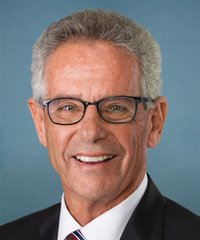
Congressman Alan Lowenthal is serving his fourth term in the U.S. House of Representatives representing California's 47th District, which encompasses portions of eastern Los Angeles County and western Orange County. He was first elected in 2012 and reelected in 2014, 2016, 2018, and 2020.
Prior to joining Congress, he served a two-decade tenure as, first, a Long Beach, California city council member, then, as a California legislator. In Washington, D.C., Congressman Lowenthal has continued his dedication to common-sense bipartisan solutions that earned him a reputation among his colleagues and constituents as one of the most respected and effective legislators in both Long Beach and Sacramento.
"While we must act in a fiscally responsible manner, deep, indiscriminate cuts to services and investments such as education, job training, energy programs, infrastructure projects, and Social Security and Medicare will cost the United States jobs and slow down our economy. Simply put: we cannot cut our way to prosperity."
SUMMARY OF STANCE
I believe that reducing our national deficit should be done in a balanced way that protects the middle class and our economy. We must keep a watchful eye on our financial institutions, that are capable of both positively and negatively impacting our nation’s economic future. We need to continue to find ways to adequately fund our nation’s infrastructure, healthcare, and research industries while at the same time promoting a social safety net for the sick, elderly and poor, in order to continue to facilitate a more prosperous tomorrow for our children and our grandchildren.
RELATED LEGISLATION AND ACTIONS:
Introducing legislation is just one action that a member of Congress can take to address a concern or issue that impacts constituents. House Members can also introduce Congressional resolutions calling on the House (or even the full Congress) as a body to recognize or support a certain event or position on an issue. Members can write letters to government leaders requesting they take certain action, hold hearings with expert panels to address issues, work with colleagues at the committee level on specific issues, or even make direct in-person appeals to other Members or officials in the government. Here are a few examples of how I have taken action on this issue.
Cutting the Deficit
The future of our country’s financial health relies in part on the passage of bipartisan legislation that reduces the deficit through responsible spending cuts and increased revenues generated by closing tax loopholes that solely benefit the very wealthy.
In early 2013, the process set in motion by the Budget Control Act of 2011 known as “sequestration” went into effect. Sequestration’s indiscriminate across-the-board spending cuts meant fewer jobs and economic investment; fewer food and drug inspectors, Forest Service firefighters, Customs and Border Patrol officers, and public defenders in our courts; less life-saving medical research, access to Head Start for children, fewer loan guarantees to small businesses, and reduced funding for our national security. While the sequester was eventually overtaken and effectively replaced by appropriations in 2016, the kinds of indiscriminate cuts manifested in the sequester are the opposite of what our economy needs. The Trump Administration approach to government funding is reckless and arbitrary. We should be investing in America and in Americans.
Financial Reform and Oversight
Our country’s fiscal health also relies heavily on the regulation of the financial institutions that are capable of both positively and negatively impacting our economic future. In response to the financial meltdown that began in 2007, Congress passed the Wall Street Reform and Consumer Protection Act of 2010 – commonly referred to as the "Dodd-Frank Act." This legislation creates common sense regulations to close loopholes opened in the preceding decades, including bringing the derivatives markets into the light of reporting, central clearing, and position limits. The Dodd-Frank Act also took steps to ensure that in a time of financial crisis, banks would be regulated in a manner that will not pose a risk to the economy or be bailed out on the backs of American taxpayers.
I believe we must continue to focus on domestic investment, and I would welcome working with the President and my fellow members of Congress to pass a budget that focuses on lower and middle income families, closing tax loopholes, and asking corporations and the top wage-earners to do their part. Without properly funding our domestic infrastructure, research, and health and safety services while ensuring a social safety net for the sick, elderly, and less fortunate, we will fail to create a better, stronger, more prosperous nation for the next generation.
CAUCUSES OR MEMBERSHIPS RELATED TO ISSUE
Good Government Caucus
This is a group of more than 40 House Members who meet to promote, discuss, and share legislative ideas related to campaign finance reform with other legislators.